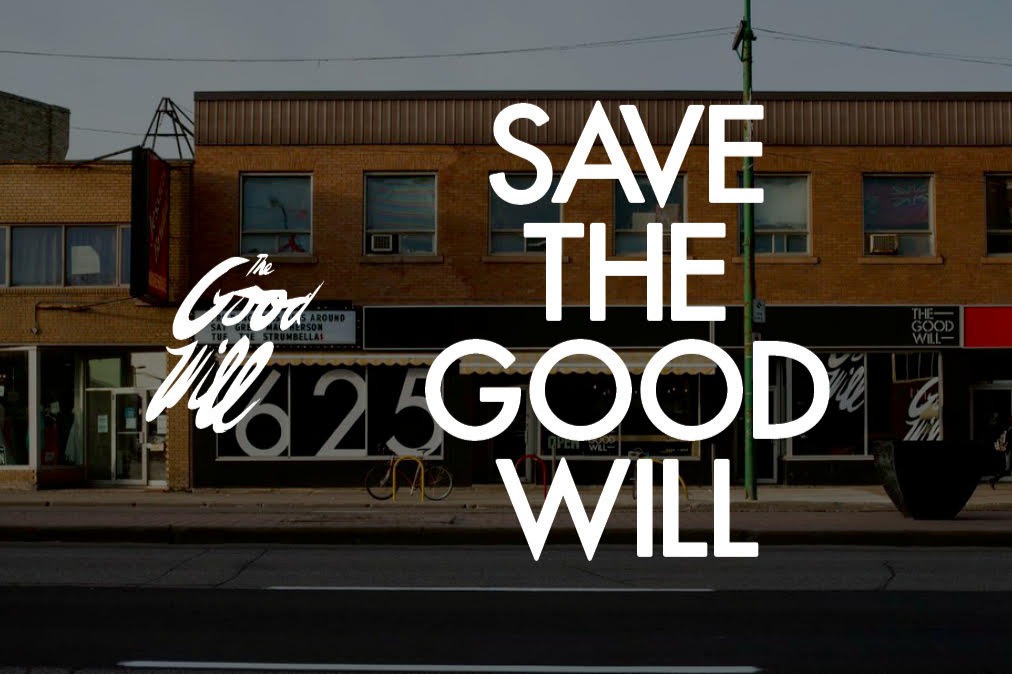
by Chris Bryson
When COVID-19 started taking its hold on a global scale, it was soon enough that festivals and venues would be cancelling their plans and closing their doors. On Monday March 16th, COVID-19’s impact on our long-term lives was further solidified as venue after venue posted to their online followers that they were closing, postponing, cancelling, getting ready for some major changes and challenges.
On April 18th Tyler Sneesby, co-owner of The Good Will Social Club, organized a GoFundMe fundraiser that in hours reached and surpassed its goal.
“The response was incredible to reach our goal in three and a half hours. You know, I just kept refreshing the page and just cried. It was like a roller coaster of emotion,” says David Schellenberg, talent buyer for and co-owner of The Good Will. “It was just so heartwarming.”
“The Good Will truly is a labour of love for us. We break even if we’re lucky each month. And you know, no one is getting rich off this place. We’re doing it to better the city and our community. And so, you know it’s one of those things where like, we were thinking before we launched the fundraiser, we were thinking that this might be it. And so just with that, with the response of everyone it was just so overwhelming and just really made sure that we want to keep doing what we’re doing.”
Cory Thomas, owner of and promoter and talent buyer for Ninjacat Productions, who is also the talent buyer for The Park Theatre, also felt the music community’s love through a successful GoFundMe fundraiser.
“It felt incredible. I was truly moved by it,” says Thomas. “I was feeling pretty damn depressed the week leading up to that with us having to close up the Park and then cancelling the festival. I was sick to my stomach at the thought of worrying about when I’ll be working again and also the huge losses I had to eat from the festival.
“When my friend Rachel Quelch approached me and said she wanted to put together a GoFundMe for Ninjacat I thought no one is going to be able to donate to this since a lot of people are out of work right now. I am so proud to be a part of the Winnipeg music scene. And this whole experience just reminded me why I love it so much. I am forever in debt to our scene and can’t thank everyone enough.”
The success of these fundraisers are remarkable public declarations of the love and appreciation held for venues and the hard work that is put in to make some of our favourite experiences happen.
But even with community and government support, COVID-19 undoubtedly poses short- and long-term challenges for musicians and local businesses and their employees. Stylus spoke with several promoters, managers, and owners of local venues to get their thoughts about the implications COVID-19 may have for their businesses and the music scene.
“It’s going to be extremely difficult,” says Schellenberg. “People are going to want to play shows once venues are open again. That’s a high-risk potential for spread and contagion.”
Schellenberg says they’ll be taking things day-by-day, because they’ve never dealt with something like this before. The Good Will’s capacity is 200 people, and with their patio it’s an additional 64, which Schellenberg sees as posing substantial challenges.
“I can’t imagine us being allowed to have that many people inside the bar for quite some time,” says Schellenberg. “So with our capacity not at that operating number and when it’s at something along the lines of like, let’s say it’ll be 100 people or 120 people or something like that, that will be quite the financial challenge for us.”
Cutting capacity means cutting drink sales, which Schellenberg says contributes a large portion of their income, which may in turn affect other areas of the business, like staffing levels and what they can afford.
“It’s going to be a headache, you know, it’s obviously a headache that’s worthwhile,” says Schellenberg. “But it will be quite difficult to see.” In the meantime Schellenberg says he and others in the industry are looking into uniting their efforts to petition the government about getting some long-term financial support.
Thomas says the pandemic has already done more damage than he and The Park Theatre’s owner, Erick Casselman, ever thought it would. They assumed they would be open by mid-June, but instead have been cancelling shows a few months ahead up until the fall, although most fall shows are either being cancelled or postponed until 2021.
“Friends running other venues in the city and across Canada are all having to do the same,” says Thomas. “At the Park we are hoping that we can open to some sort of capacity in September. I don’t think we will have many touring bands, if any, coming through in 2020. If we get to open in September even at half capacity, then we will fill the calendar with all local bands.
“In the meantime all of our staff including me are not working and receiving the CERB. The biggest challenge is paying the mortgage until we can open again. We are toying with some different ideas of ways to raise funds. The unfortunate part is there will be venues that don’t survive the pandemic. We are booking a lot of events for 2021 hoping this is under control by then. I would be lying if I said I wasn’t nervous even about 2021.”
The West End Cultural Centre postponed all events on March 16th. Jason Hooper, executive director of the not-for-profit charity venue, says he’s “a little worried that people are losing sight of why the long term is important.”
One of the issues Hooper sees is with the challenge of reopening places like venues and larger scale arenas, stadiums, and convention centers, and he is skeptical about how you would maintain social distancing protocols in those circumstances.
“The temptation is going to be there to relax,” says Hooper. “I think it goes against our biological nature to be this far apart from each other. So I think once the temptation is there it’s going to be very tough to resist.”
The Handsome Daughter similarly closed its doors but has been fortunate to be able to continue operating the Magic Bird Fried Chicken restaurant out of its space via takeout and delivery. Mischa Decter, The Handsome Daughter’s general manager, says they’re not in any rush to reopen the bar or venue when restrictions loosen as their current model is proving to be sustainable, and they’re keeping safety a number one priority.
Decter foresees that some venues that can’t currently generate any income might end up having to close their doors permanently within the year. “There is already a feeling that there aren’t enough small-mid-sized venues in the city, and any changes to that could leave bands itching to play out with fewer options in the long term,” says Decter. “If we can’t fill our venue to our normal capacity, we can’t generate enough income to pay bands, employees, bills, etc.”
This restricted capacity issue presents a major problem for venues that are largely dependent on ticket sales for revenue. John Scoles, president and owner of the Times Change(d) High & Lonesome Club, says they’ll be closed until they’re able to offer people an experience that everybody can feel good about. One of the biggest challenges for venue owners and managers seems to be the balance of making enough money to cover expenses while maintaining moral responsibility for the safety of their patrons and the people they work with.
“Unfortunately, it is hard to imagine how a respect for science and health is going to jive with running a bar going forward. It’ll just have to be a matter of patience. A lot of patience,” says Scoles. “I don’t envy the venues that need large numbers to cover costs of presenting and overhead. The smaller ones will likely have a bit easier time reintegrating.
“Honestly my biggest concern is nurturing the musicians and the fans. We have to take care of those people. Without them, it won’t matter if there are venues or not.”
Jordan Cayer, who is the café manager and does music programming at Forth, says adaptation will play a role as the business works a way around not having income coming in from evening events, and puts more emphasis on offering services like food and beverages.
“The one thing about it is that it is pretty cut and dry,” Cayer says about live music events. “It’s like this isn’t going to happen for a while, and we’re going to have to find a way to live with that. I mean as a musician myself it’s an extra bummer, because I don’t know the next time I’m going to be able to play a show. But as a venue booker and manager, it’s like I get to see both sides of it, and it’s very strange. Very strange feeling. Very strange times.”

